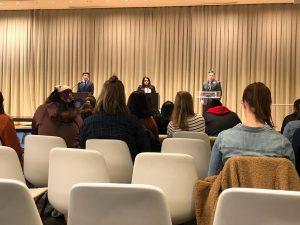As the school year began, the Voice, along with other student organizations, grappled with the fate we have come to expect every year: a reduced budget. While budget cuts aren’t unique to media organizations, we argue that the role student journalism plays on campus is invaluable. The editorial board’s call is twofold: first, that Georgetown establish reliable financial infrastructure to fund student media through a dedicated endowment, and second, that GUSA not control funds allotted to student media.
Student media is crucial in holding institutions accountable. In the past year and a half, the Voice broke stories on the continued mistreatment of facilities workers and covered Georgetown’s silencing of a racist hate crime against LaHannah Giles (CAS ’23). The Hoya’s reporting covered Georgetown professors’ refusal to enact students’ ARC accommodations and William Gaston’s enslavement of more than 163 people. Knowing that our greatest resource is our coverage, we report on District-wide issues such as gun violence and publish progressive editorials demanding D.C. statehood and housing people over removing encampments. While our journalism isn’t perfect, we are committed to creating a culture of journalism that amplifies diverse voices and campus activism, informing the campus consciousness around social justice issues, and pushing Georgetown to do better.
But our role in the community isn’t limited to our breaking news—equally as important, we are an avenue for creative expression, sports commentary, and cultural criticism. The Indy has long been an avenue for students to express their thoughts on arts and culture while also being used to elevate creatives on campus. The Anthem and Bossier allow students to express themselves freely. Groups like WGTB host concerts and other events that give students the opportunity to showcase their work and are a valuable source of entertainment. The Blaxa allows Black students to express and empower themselves. All of these contributions rely on hours of unpaid labor because students seek to share their work and passion with the larger student body.
Given the critical role student media plays on campus, Georgetown must establish permanent financial infrastructure to fund us. This year, Media Board—the umbrella grouping of student publications—received approximately two-thirds of its requested allocation. Groups were forced to resubmit budgets cutting thousands of dollars of expenses. While that might seem insignificant, our revenue is entirely spent on operational costs—print contracts, Adobe accounts, and more. There is no money to spare.
GUSA should not have control over the budget of student media. Currently, all student media organizations are allocated funds by the Media Board. Media Board, in turn, is funded by GUSA’s Finance and Appropriations (FinApp) Committee, which singularly determines how to divide the Student Activities Fee—which totals $1,194,200—between all seven club Advisory Boards and the five student organizations outside their jurisdiction.
While GUSA has contributed meaningfully to the Georgetown community, we don’t believe that it should be given this enormous funding power. GUSA elections and referendums have historically been characterized by low voter turnout, suggesting that its legitimacy isn’t recognized by most of the student body.
Further, GUSA should not be in charge of the funds for the very student organizations that report on them. Student media organizations, especially the Voice and The Hoya, have been reporting on GUSA for decades. The Voice’s reporting on GUSA isn’t always positive and the candidates we endorse don’t always win their elections. This presents a potential conflict of interest: student media may feel as though they must limit negative coverage in order to avoid further budget cuts from GUSA. This is far from democratic; student media shouldn’t be beholden to the very institution it reports on.
The editorial board also strongly disagrees with GUSA’s stated reasoning for budget cuts. The FinApp committee pointed to the environmental sustainability of print journalism, citing falling publication pickup rates. This is inconsistent with the Voice’s own internal distribution audits, which show that our pick-up rates exceeded 80 percent in the last academic year. To us and many other publications, the act of physically engaging with the community through printing is more expansive and personal than social media.
While it is true that our online readership is also at record highs, without the funds to preserve our issues in print, the Voice would have no physical presence to remind students or the Georgetown community to read our work online.
Environmental sustainability is a priority of ours as well, but it is worth highlighting that the FinApp committee focused solely on Media Board, conveniently ignoring the excessive amounts of flyers and advertisements that go to waste each week from many student organizations. Consulting our editors to devise solutions would be an effective way to act on sustainability concerns, rather than use budget cuts to enact policy. FinApp was also concerned by “$65,010 of unnecessary spending” from the largest media organizations, including the Voice, but did not delineate the exact spending they are referring to, who spent it, and why they view it as unnecessary or unjustified.
Without sufficient funding, we will also be unable to afford the equipment and resources to make our journalism more accessible. For instance, the Voice was unable to offer its Steve Pisinski Student Journalism Grant to help students afford unpaid internships in journalism last year, due to anticipated cuts in FY24. Journalism is rife with barriers to entry—from professional connections to previous experience. The Voice is committed to making journalism as accessible as possible, but we cannot offer grants that facilitate this without funding.
Georgetown must establish a reliable financial infrastructure to fund student media; GUSA should no longer be that infrastructure. Rather, we need a stable, well-funded source of financial support that doesn’t come from students with conflicting interests. This could come from the university in the form of a dedicated endowment—a solution that would not only ensure that student politics don’t wield power over the outlets that report on them but would also free up funds from the stretched student activities fee. Only by removing GUSA’s authority over student media can we truly guarantee the future of a free press at Georgetown.




